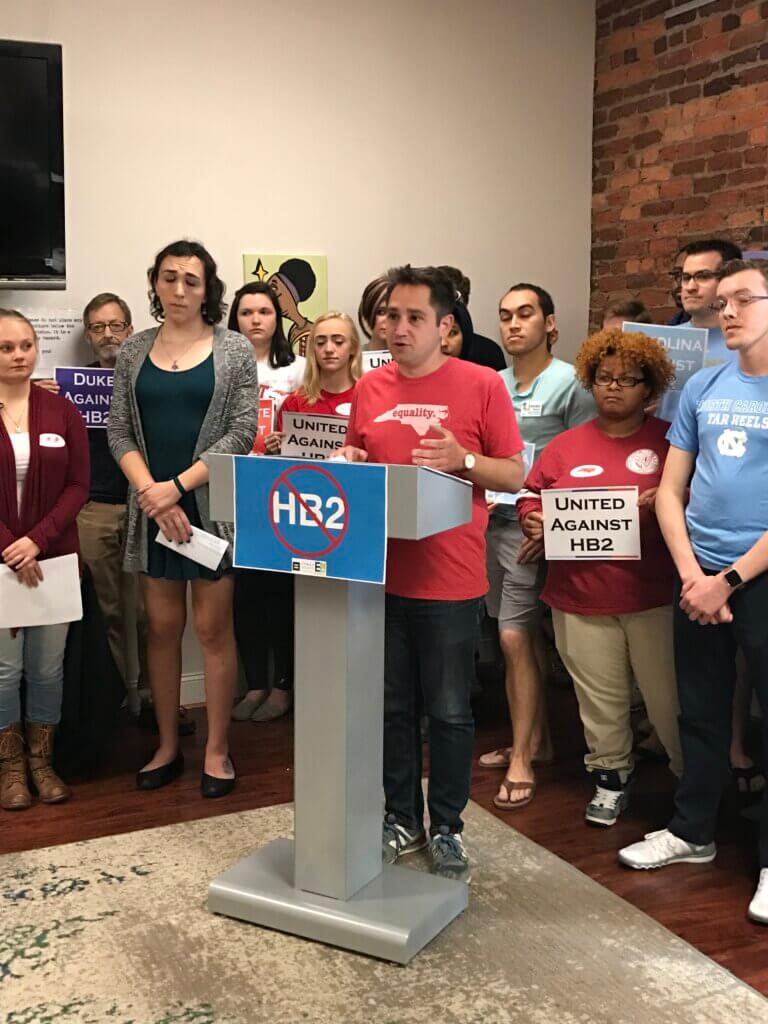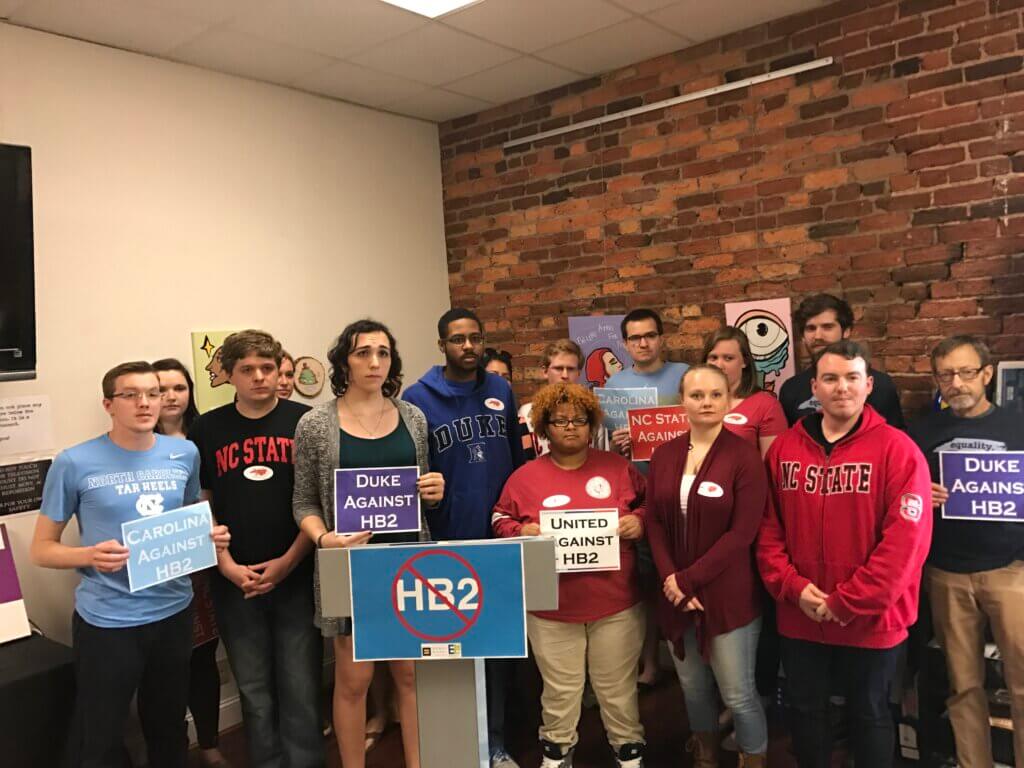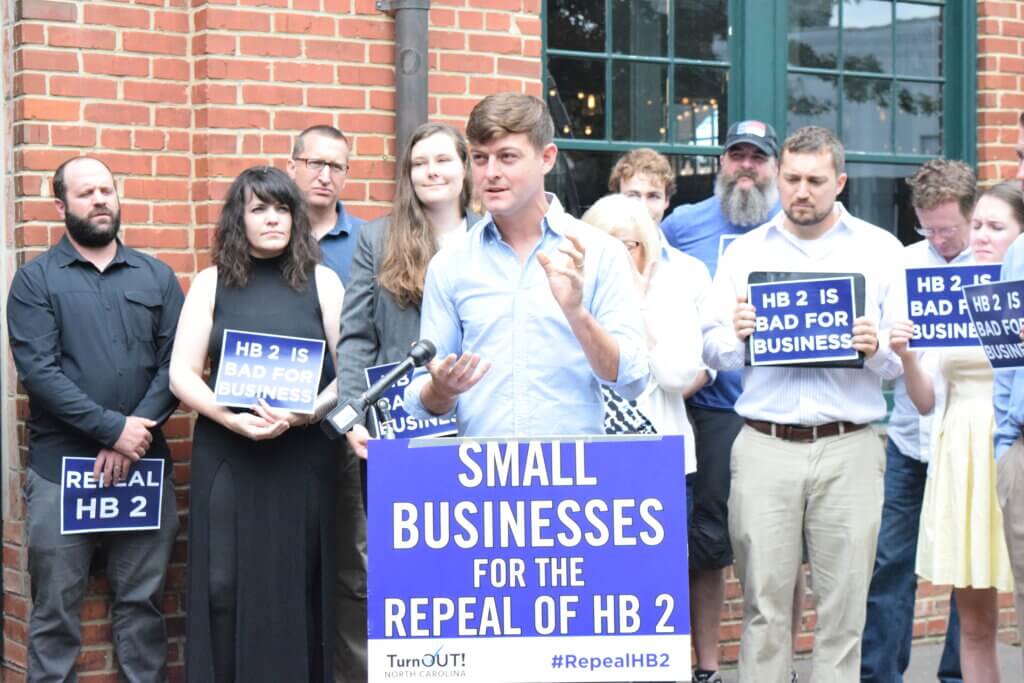Blog Post • August 12, 2024

2024 has been far from unremarkable for national politics. We're well underway in a presidential election year, and many states, including North Carolina, have a lot on their ballots and within their political sphere. But one cannot look forward to what we have at stake this year without looking back at how we've gotten here. North Carolina has a vast and diverse community of residents from all backgrounds, origins, and identities. In the years since 2020, we've especially welcomed an influx of people, a testament to our growth and vibrancy. However, how does North Carolina treat its people? What rights does North Carolina decide to hold? 2016 saw some of our country's earliest national battles for human rights. North Carolina became the nexus for the execution of a nasty messaging agenda based on misinformation and fear. Will we ever outgrow that shadow, or will we always be known as the state that allowed HB2 to fail our people and businesses through those efforts?
Today, North Carolina residents sit amidst a Republican-led legislature, which has shifted statewide priorities and often led to discord between our branches of government. 2016, though not unique in setting the stage for the governing structure we have today, stands out as monumental because it holds us in a flashpoint- the rights of our people challenged due to a larger messaging agenda designed to sow fear in our communities, leading us to activate our defenses instead of coming together and learning about the rich experiences that the diversity of our state has to offer.
In 2016, North Carolina became the first state in the country to pass a "bathroom bill" — a framework centered on fear but did much more to normalize discrimination in our communities both in North Carolina and the nation. The piece of legislation, HB2, dictated the usage of restrooms according to your birth certificate marker. Such a bill not only put forth fresh waves of misinformation and outdated information about sex and gender in humans but specifically paved the way for legal discrimination against transgender people in North Carolina. House Bill 2 also removed the ability to sue in state court over discrimination and prevented local governments from enacting nondiscrimination policies. In 2017, lawmakers rewrote this legislation, which included a ban on local nondiscrimination ordinances for over three years.

The ramifications were felt at home in North Carolina and the United States. HB2 was terrible for our perception as a commerce-friendly state. HB2 was wildly unpopular to North Carolina voters and residents, which ignited many civil rights groups like ours and prompted businesses, entertainers, and sports leagues to boycott the state. As NPR recently posited, In response to HB2, PayPal canceled a planned expansion that would have brought 400 jobs to the state, and the NCAA withdrew its tournaments. Additionally, performers like Bruce Springsteen and Cirque Du Soleil canceled their shows. The Associated Press estimated these actions would cost the state $3.76 billion in lost business over the next twelve years. All the while, residents' worry grew as they came to grapple with questions about what protections they had, where they could exist safely even within their home communities, and watched as human rights became a piecemeal in our political landscape rather than a fundamental need for our society to progress towards a community designed for them to live and thrive in.

Though seen as groundbreaking, these efforts became commonplace throughout the country. This play was brought to us by conservative measures aimed at eroding human rights for everyone. The tactic is to pick something to get people riled up about, something that, on the surface, would be hard to justify the value of inclusivity but not wrong to advocate for. NPR recently quoted Terry Schilling with the American Principles Project, a conservative think tank, who says, "The women's sports issue was the first thing that took off because it had that magic formula of having an incredible amount of public support amongst the American people, but also politicians were willing to run on it and campaign on it…I don't think you could have done it by focusing on the bathrooms. I think it would be dead right now without the women's sports issue."
Discriminatory legislation like HB2 activated our communities based on fear and misinformation, misrepresenting crime in NC and failing to address the root causes of crime in North Carolina by providing protections for the communities they claimed to want to protect. It led us to shift how we view the people nationally in our towns, schools, stores, and local grocery stores. It led to a national movement of grappling with how to move forward and how to enforce the democracy upon which our nation was built while attempting to account for and outgrow the legacy of hate and fear that stains our history forever. But from fear and hate came the spark that has led to a movement beyond and alongside policy. One that only grows as our community continues to face uncertainty in our decades-long efforts to ensure human rights for all. The resilience and determination of North Carolina residents in the face of such challenges is truly inspiring, and this spirit will continue to drive our movement forward.
In the years since 2016, North Carolina has grown stronger in developing and sustaining resources to lead us through political agendas like we've seen through campaigns like HB2. The passage of HB2 in 2016 marked a pivotal moment for Equality NC, sparking a profound transformation within the organization. While the controversy and criticism surrounding HB2 brought significant challenges, it also catalyzed a new strategic direction and a more intersectional approach to our advocacy work. Equality NC has worked to listen to our fellow leaders in this movement, our elders who have come before us, and pave the way for a tomorrow that is free from fear and allows us to be free to be. Our network has grown, especially internally, as Equality North Carolina's aim remains focused on fighting for our queer and trans communities from the metros of Charlotte and Raleigh to the mountains of Boone and Hendersonville, to the beaches of Wilmington and Kitty Hawk, to the coffeeshops you may find just a five-minute walk from your doorstep. We've worked to ensure that our efforts intertwine with the efforts of our partners, who fight tirelessly among us for reproductive rights, education access, better workers' rights, and development that honors the rich legacy of our communities while welcoming fresh faces that breathe life into our everyday routines.
This commitment to inclusivity has guided our efforts, and since HB2's sunset, we have successfully advocated for the passage of numerous nondiscrimination ordinances (NDOs) across North Carolina. Our other organizing efforts include outreach throughout the state, and we've worked to increase opportunities for our youth, such as our Rural Youth Engagement program, providing them with opportunities to develop skills they will use throughout their professional careers. These milestones are a testament to our dedication to protecting and advancing the rights of all people, ensuring that our progress is both enduring and expansive. As we look to the future, we can see the progress we have made in the fight for human rights, and it is this progress that gives us hope and optimism for the road ahead.
We've witnessed what has happened throughout the country with such sadness yet determination to unite and use our experiences to create a better national outcome. And it's not over yet. We've witnessed national waves like Florida's discriminatory legislation sweep the nation similarly. As recently as earlier in July 2024, we've seen efforts like the vote to overturn a Biden administration rule bolstering federal nondiscrimination protections for transgender students. People are still actively vying to sow misinformation and fear and capitalize off hate through discriminatory measures. But we have so much more to do, and together, our impact grows.
HB2 was pivotal in our history, but our community is fantastic at creating the solutions we need to create a future that shines brighter and rights some of our nation's most prominent acts of injustice. Regardless of what discrimination prevails, we still exist in a much larger context. Queer and trans people have existed across cultures, across time, and in blazing defiance of the notions put forth by the framework behind HB2. And we cannot do this work alone. We need you, your people, and your energy as we push for more equitable policies in North Carolina and our country. We must resist the urge to concede and instead invest in our community by spending our time learning and growing and updating our proverbial field guide to our state, contributing resources to efforts aimed at creating more opportunities for the success and wellbeing of our people over larger - yet more private - interests, and learn about how to make equality the baseline of what our policies value instead of an aspiration or a mere dream.
HB2 was a pivotal signal to how much our struggles to provide robust and affordable education to our public has eroded our worldview and understanding of how we combat the hate infused in the extremes hosted in pockets throughout North Carolina, even despite the burgeoning tech advances that have put us face to face with people throughout the world at the press of a button, something that we've never had the privilege of experiencing before. The effort to sow discrimination has only highlighted the need to invest in infrastructure that provides resources to North Carolinians throughout the state, from our public health resources to increases in funding for our education system tasked with preparing our students for tomorrow. Our community does need changes, but changes that bring us toward growth. Much like any state or person wanting to grow, North Carolina cannot do so sustainably when fear and hate drive the narrative. Our queerness, joy, and ability to create, welcome, and learn from what we do not know, to build more to accommodate instead of restricting, will lead the way.